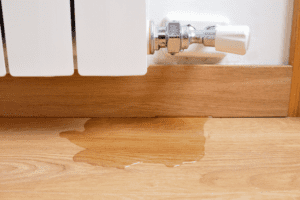
The Signs of Water Damage
Water damage is one of the most common hazards in any home, old or new. It can happen at any time and cause many different problems, leaving the homeowner in a (literal) mess. Any sort of leak, whether it be from a pipe or roof, can cause serious structural damage and if not properly handled and repaired, this damage will only worsen over time.
Many property damages caused by water and leaks are avoidable. By paying attention to small problems and getting them fixed immediately, many of the issues could have been prevented. The trouble is that lots of people think they can save money by fixing water damage or a roof leak on their own. And yes, this might be doable for tiny problems with superficial damage.
But what you see is often just the surface layer: most harm is lurking deep within your walls where it leads to much bigger issues such as structural instability-- something only an expert should handle before your house's integrity becomes irrevocably compromised.
Your home is not only susceptible to structural damage from water, but mold can also quickly begin growing. This can cause health problems, both big and small. So it’s best to not delay remediation and get the problem fixed before it gets too serious. Delaying repairs could end up costing a lot more money and could be hazardous health-wise. However, water damage can be tricky to spot as the signs are not always immediately apparent. Some cases are more obvious than others, but sometimes the damage is gradual and subtle.
Dark or wet spots
Be on the lookout for any color changes on your ceilings, or walls (inside and out), as watermarks will often give these areas away.
Crackling, bubbling, or flaking
If you notice your drywall or paint beginning to show signs of wear such as cracking, bubbling, or flaking, this could be an indication of water damage.
Puddles or pools of water
If water keeps coming back after you've cleaned it up, that means you might have a leak.
You hear running water
Although you can't always see water damage, you might be able to hear it. If the floor starts creaking or dripping sounds become more frequent, this could mean there is a problem even if the system was previously functioning normally. Therefore, listen for changes in sound to catch potential problems early.
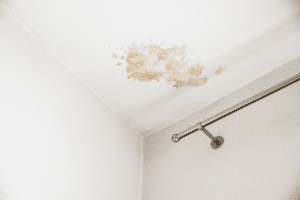
Damp, musty, or moldy smell
The scent of dampness, mold, and mildew is unmistakable and often a telltale sign of water damage.
Unexplained increase in energy bills
A price hike in your water bill could be due to an undetected leak.
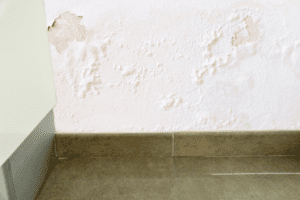
What Are the Most Common Sources of Water Damage?
Water damage is a serious issue that affects buildings in many ways. When water seeps into areas where it doesn't belong, your floors could warp and your walls may start to discolor. The moisture can also lead to mold growth inside the building as well as an infestation of vermin. If water damage is not immediately addressed through restoration, it could eventually weaken the foundation of the building.
Although it might not seem like it, water damage is actually quite expensive. In fact, there have been instances where just a few inches of flooding have caused thousands of dollars in damages that needed to be fixed.
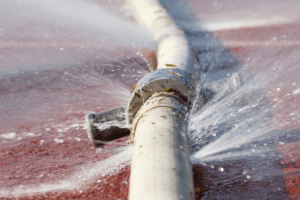
Severe weather
Although natural disasters like thunderstorms, hurricanes, and others seldom occur, there is always the possibility of water damage if they do. For example, heavy rains could potentially harm your roof which would then allow rainwater to enter your home or business. Unfortunately, during severe weather conditions flash flooding can sometimes happen; this is especially true if your property is located in an area that's prone to floods.
Clogged gutters
The gutter system's purpose is to draw rainwater away from a house. Although, gutters get backed up by leaves, branches, and other debris with time. Therefore, when that occurs, rainwater can't flow properly from the property, resulting in water overflowing along the edges of your gutters, dripping down the side of your home, and causing damage to ceilings, floors, etc.
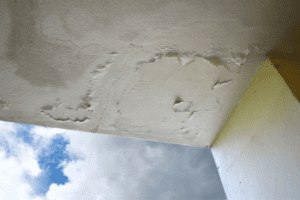
Leaking pipes
If a water pipe leaks, it could damage the kitchen sink cabinet or worse. If the leak is in a pipe inside the walls, it would be even more complicated and result in huge water damage because an entire wall would be wet. This also creates ideal conditions for mold to grow. An even bigger problem is when a plumbing supply line or drainage pipe leaks under your concrete slab since this usually leads to costly repairs.
Washing machine water supply line leak
If your washing machine's water supply lines are made from braided stainless steel, you're in luck. However, if they're rubber or PVC, they could quickly wear out and break, leading to a laundry room flood unless you turn off the water source immediately.
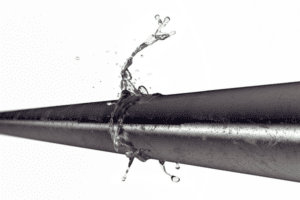
Condensation from AC
If your air conditioner is running cooler than usual, or you hear water dripping, it may be that the unit's evaporator coil is damaged and needs to be repaired. When this happens, moisture drips from the coil into a drain pan and out of your property through a condensate drain line. If the drain pan becomes rusted or corroded, it will need to be replaced. In some cases, the problem might lie with clogged condensate drains caused by dust buildup over time. These problems can cause leaks in your home as well as damage floors and walls - even wet insulation in extreme cases
Blocked drains
There are many reasons why your kitchen, bathroom, and tub drains might become clogged. Hair, grease buildup, toiletries, dirt or even toys and other foreign objects can obstruct the drainpipe and prevent proper drainage. If left untreated, a clogged drain can easily back up and cause flooding inside your property.
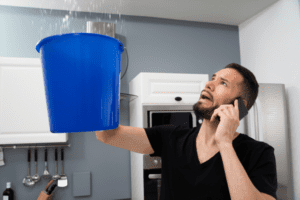
Malfunctioning sprinkler system
Although a sprinkler system can save your life and property during a fire, some older systems have turned on without indication of any flames. The water damage from these false alarms can be costly, especially if you have electronic appliances around your home or office.
A leaking water heater
Water heaters don't last forever, and if yours is old, it's more likely to leak. The same goes for water heaters that aren't maintained well or installed properly. Sometimes, too much tank pressure causes a leak. When a water heater leaks, the basement can flood quickly since that's usually where they're located. Water damage is hard to prevent, but if you address the possible causes mentioned above, you might be able to minimize it at least somewhat.
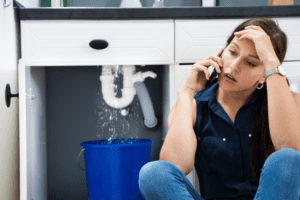
How to avoid getting water damage
- Inspect your hoses and faucets regularly. Annual check-ups of washing machine, dishwasher, and refrigerator hoses are recommended by experts in order to catch cracks or water leaks early. All hoses should be replaced every 5-7 years.
- Inspect your showers and tubs for any caulking damage. If the caulk is cracked, water could potentially leak through those cracks and saturation your floor--which mold loves. You can buy caulk very cheaply at most hardware stores to prevent this from happening
- Learning how to shut off your water main is crucial in an emergency. If a pipe bursts, shutting off the water main will stop the flow of water and prevent further damage.
- To avoid extensive damage from small, slow leaks, install floor pans under appliances.
- Purchase point of leak water alarms to be aware of potential water damage in your home. These sensors work similarly to smoke alarms: when water is detected, an alarm will go off so you can take action. Place these around the house in areas that are prone to leaks, such as basements, laundry rooms, bathrooms, kitchens, or next to the sump pump.
- A water flow monitoring system is a great investment for your home. The system hooks up to your water main and monitors the flow of water into your house. If it detects any unusual or continuous flowing, it will automatically shut off the incoming water. This protects your entire house from expensive flooding damage.
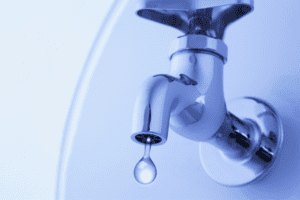
Got Water Damage? Worried About Future Water Damage? The Best Thing You Can Do Is Call Oak Plumbing
We established Oak Plumbing to bring masterful plumbing back into our community. Our highest values are providing sterling customer service and keeping your family safe. That is why we only employ licensed and background-checked experts. Between our professional employees and our commitment to our customers, there's a very good reason why most of our customers give us five-star reviews. Become one of them and come on down to Oak Plumbing now!





